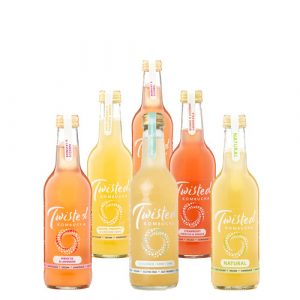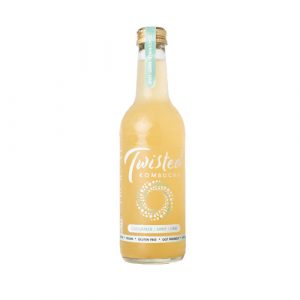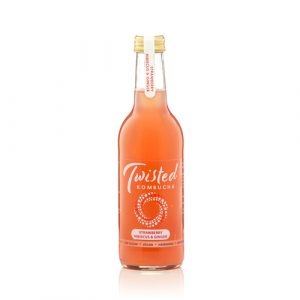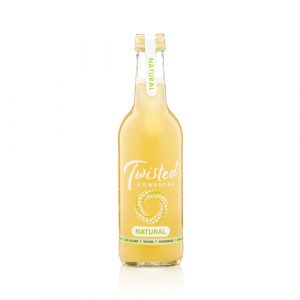
Ah, Kombucha – the naturally effervescent, , tangy and tasty elixir that’s become my daily obsession on this explorative journey of health and wellness.
I’m Lou, and as a nutritionist and lover of all things that nourish our body and soul, kombucha holds a special place in my heart.
I often get asked by people, “Is kombucha gluten-free?” Well, you’re in the right place because in this blog, we’re going to unravel the science behind kombucha, explore its gluten-free status, and see how it can be a benefit to those with gluten sensitivity.
Kombucha: A Gut-Friendly Fermented Beverage
Firstly, let’s talk about this gut-loving elixir – kombucha. It’s not just a drink; it’s a small miracle in a bottle. Kombucha is created by blending sweet tea with a magnificent living thing known as a symbiotic culture of bacteria and yeast, or, as we affectionately call it, SCOBY.
This incredible SCOBY goes to work during fermentation, munching away on the sugars in the tea and crafting a symphony of organic acids, enzymes, probiotics, and antioxidants. The outcome? A sparkling, healthful concoction that’s like a party for your insides.
Gluten Sensitivity: A Growing Concern
I wanted to bring up a subject which is often confusing for some people about the difference between gluten sensitivity and celiac disease. Celiac disease is an autoimmune disorder, whereas gluten intolerance is a sensitivity.
Celiac disease causes significant harm to the small intestine when gluten which is the protein found in wheat, barley, and rye is consumed. It affects genetically susceptible individuals to negatively respond and is a serious disorder. If you are diagnosed with celiac disease, the most effective way to manage the symptoms is to completely cut gluten from your diet.
On the other hand is gluten sensitivity, AKA non-celiac gluten sensitivity (or NCGS for short). Sufferers will feel unwell after eating gluten but without celiac disease’s specific markers. NCGS does not typically have a full negative impact on overall health like celiac disease can. Gluten sensitivity is not an immune disorder or an allergy whereas Celiac disease is a serious illness where the body’s immune system attacks itself when gluten is eaten, causing damage to the lining of the gut and means that the body cannot properly absorb nutrients from food.
Both celiac disease and NCGS are treated by not eating gluten. Someone with celiac disease must avoid gluten completely for their entire life as it is very harmful as his or her immune system will attack against its own body’s tissue. Whereas a person with gluten sensitivities, will experience short-term bloating and belly pain.
More and more folks are becoming gluten-sensitive, facing discomfort and health imblances that can impact the wellbeing and daily life.
Let’s dive into this gluten-sensitive world and see how kombucha can be a part of the recovery.
What Causes Gluten Sensitivity?
Now, let’s turn our attention to a bit of a mystery: what sparks gluten sensitivity? This puzzle is still a work in progress for the research community. But here’s what we do know: gluten sensitivity is not the same as its more famous cousins, celiac disease and wheat allergy. It’s like the third sibling in the family that’s a bit hard to figure out. In simple terms, gluten sensitivity is when your body isn’t thrilled about gluten, but it doesn’t go into full autoimmune mode like in celiac disease, or trigger an immune frenzy like in wheat allergy.
So, what could possibly be causing this gluten sensitivity sensation? Well, the experts have a few theories, and it’s all a bit like piecing together a complex puzzle.
NCGS
First up, we’ve got Non-celiac Gluten Sensitivity (NCGS). Think of it as a diagnosis of “It’s not celiac disease, and it’s not wheat allergy, so it must be NCGS.” But here’s the twist: the exact reasons behind NCGS are still a bit of a head-scratcher. Some experts suspect it might not be all about the immune system; it could be related to how your gut responds to certain sneaky carbohydrates called FODMAPs found in wheat products.
Gut Health
Our gut microbiome, as you will probably already know is a bustling community of microorganisms in your belly, might play a part in this gluten drama. If your gut’s not a happy camper, it could be reactive with the gluten and create those not-so-fun stomach symptoms.
Immune Response
In gluten sensitive people it might not launch a full-scale attack like in celiac disease, but it could
still be giving mild immune reactions, which isat the heart of the symptoms. The research is not yet fully conclusive regarding this.
So, you see, it’s a complex tale. But don’t worry, there’s more to this story, including how kombucha fits into the picture.
Symptoms of Gluten Sensitivity
Gluten sensitivity is a bit of a master of disguise. Its symptoms like to play hide and seek and can mimic those of other tummy troubles, making it a bit of a challenge to diagnose.
So, what might you experience if you’re not tolerating gluten? Let’s take a closer look at the cast of common symptoms:
- Gastrointestinal Distress: This is where the belly drama unfolds. It can include abdominal pain, bloating, feeling gassy, and sometimes a battle between diarrhea and constipation. It’s like a rollercoaster ride of tummy sensations, and gluten often gets the blame for triggering or worsening the commotion.
- Fatigue: Here’s a big one – feeling exhausted even after you’ve had your beauty sleep. It’s like the tiredness doesn’t want to leave the party, and that can put a damper on your daily adventures.
- Headaches: If you’re prone to frequent headaches, gluten sensitivity might be the sneaky culprit. Going gluten-free could mean fewer headaches and a lighter burden on your noggin.
- Joint Pain: Imagine feeling like your joints have gone on strike. Some people with gluten sensitivity experience joint pain or inflammation. It’s like your body’s playing a trick on you, often leading to misdiagnoses like arthritis.
- Skin Issues: The skin might not be too pleased with gluten either. It can lead to skin problems like eczema, psoriasis (those itchy, scaly patches), and dermatitis herpetiformis (a pesky, itchy skin rash).
- Mood Disorders: Sometimes, it’s not just your tummy – it’s your mood too. After all, we know our moods are mediated with what happens in the gut. Anxiety and depression may be prevalent. The good news? Making friends with your gut, possibly through some fermented delights like kombucha, could lead to a mood boost.
- Neurological Symptoms: Lastly, gluten can mess with your brain, making you feel a bit off balance, creating tingling sensations, and causing concentration issues. This package of symptoms often gets the name “gluten ataxia.”
Now that you’ve met the suspects, stay tuned for the next section, where we’ll talk about what foods to avoid and how to manage gluten sensitivity. We’ll also get into how a live and unpasteurised kombucha can be your gluten sensitivity ally!
Dietary Restrictions and Management
Let’s chat about how to navigate dietary restrictions when you’re gluten sensitive. The key here is reducing your gluten intake, which means steering clear of wheat, barley, rye, and any products that carry traces of these grains. It’s a label-reading game for sure, but there’s still a world of tasty, gluten-free delights to enjoy.
So, what’s on the menu for gluten sensitive people? Well, plenty! Your options include a rainbow of fruits, a garden of veggies, lean proteins and ancient grains like rice, millet, sorghum and quinoa. It’s all worth exploring the gluten-free world and finding the dishes that tickle your taste buds, but its also important to make sure that your gluten free products are not ultra processed foods with a lot of ingredients and additives which are still bad for our overall health.
Kombucha and Gluten: The Gluten-Free Connection
Now, here’s where kombucha makes its grand entrance. Kombucha, with its fizzy charisma and potential health benefits, takes a front-row seat at your gluten-free feast. The probiotics and enzymes in kombucha aren’t just there for show; they’re gut warriors on a mission. By sipping on some fermented goodness, you’re treating your gut to a symphony of friendly microorganisms, like the ones found in Twisted Kombucha, which may work their magic on your digestive comfort. It’s like inviting a digestive wizard to your table, helping you cast spells of symptom relief.
So, there you have it – the scoop on gluten sensitivity, its sneaky symptoms, and the gluten-free gastronomic adventure that awaits you. Next up, we’ll dig deeper into how kombucha, like the ones we offer here at Twisted Kombucha, can be your ally in the quest for gluten sensitivity management and digestive harmony.
The Role of Fermented Foods in Gut Health
When you dive into the world of gluten sensitivity, one thing becomes clear: the gut takes center stage. Many folks dealing with non-celiac gluten sensitivity (NCGS) find themselves in the throes of bloating, abdominal pain, and those classic gastrointestinal suspects, diarrhea and constipation. It’s like an internal drama where your gut microbiome, a bustling city of trillions of microorganisms, plays a leading role in the plot.
Here’s where our gut-loving celebrities, fermented foods like kombucha, take the stage. They’re not just delicious drinks; they’re your gut’s cheerleaders. Here’s how they shake things up for your belly’s benefit:
- Probiotics: The stars of the show, probiotics are beneficial bacteria. Fermented foods, including kombucha, are teeming with these probiotics. Their mission? To maintain law and order in your gut, ensuring it’s a harmonious ecosystem. This not only aids digestion but also helps out your immune system, which can be a real comfort for those wrestling with the gastrointestinal ups and downs of gluten sensitivity.
- Digestive Enzymes: Think of these as the stagehands of your digestive system. Fermented foods often contain enzymes that specialize in breaking down and ushering in the absorption of nutrients. This backstage crew can be a game-changer for those dealing with compromised digestion due to gluten sensitivity.
- The Anti-Inflammatory Brigade: Chronic inflammation isn’t your gut’s best friend. It’s linked to many health woes, including those that give gluten-sensitive folks a hard time. Fermented foods come to the rescue with their anti-inflammatory powers, potentially soothing gut discomfort and quelling inflammation.
- Synthesis of Nutrients: Some gut bacteria are like little nutrient factories, churning out vitamins and essential goodies. When your gut microbiome is in balance, it helps maintain your overall health. It’s a savvy way to offset any potential nutrient gaps that gluten-related digestive hiccups might cause.
- Mind Matters: Now, this is where it gets intriguing. You might have heard of the gut-brain connection. It’s a hot topic in research, and for good reason. A healthy gut microbiome can have a profound impact on your mental health. If you’re suffering from gluten sensitivity, finding relief in the form of kombucha and its gut-soothing capabilities can work wonders for your mood and overall well-being. So, it’s not just your belly that’s getting the love; it’s your brain too.
Twisted Kombucha and Your Gut Health
We hope this blog helped you understand more about gluten sensitivity and fermented beverages like kombucha.
Here are Twisted Kombucha, we’re not just creating beverages; we’re brewing wellness for your gut and beyond. Our kombucha, is always handmade in small batches, therefore will be naturally rich in probiotics and gut-loving enzymes, supporting your health, especially if you’re dealing with gluten sensitivity.
For a deeper dive into this wellness journey, check out our blogs. They’re the key to understanding the intricate relationship between kombucha, gluten sensitivity, and more.
Plus, find inspiring recipes and wellness tips on our Instagram. We’re here to help you embrace gluten-free possibilities while savoring every moment.
At Twisted Kombucha, we’re not just a brand; we’re your partners in the quest for a healthier, happier you. Cheers to a vibrant life!
FAQs
Is all kombucha gluten-free?
While most kombucha is gluten-free, it’s essential to verify the label and check for potential cross-contamination.
What are common symptoms of gluten sensitivity?
Common symptoms include abdominal pain, bloating, diarrhea, constipation, and fatigue, although symptoms can vary widely among individuals.
How can probiotics in kombucha benefit those with gluten sensitivity?
Probiotics can help regulate the gut microbiome and may alleviate some of the gastrointestinal symptoms associated with gluten sensitivity.
Are there specific strains of probiotics in kombucha that are particularly helpful for gut health?
Lactobacillus and Bifidobacterium strains are often found in kombucha and are known for their potential gut health benefits.
How does kombucha reduce inflammation in the gut?
The antioxidants and polyphenols in kombucha, along with its probiotics, can help reduce inflammation and oxidative stress in the gut.
Can kombucha help with mental well-being for those with gluten sensitivity?
A healthier gut microbiome, achieved in part through the consumption of fermented foods like kombucha, may positively influence mood and mental well-being.













